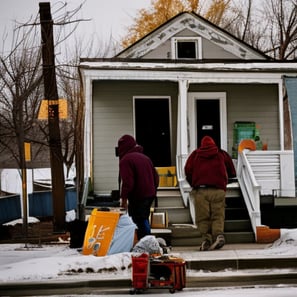Introduction
 Homelessness has become an increasing problem in cities around the United States. In Detroit, however, the city is taking a unique approach to combat this issue – they have implemented a “Housing First” policy. This policy focuses on providing homeless people with permanent housing as quickly and efficiently as possible, rather than focusing on temporary shelters or other short-term solutions. The goal of this effort is to give homeless individuals stability and security by moving them into safe and secure homes of their own. In this article, we will explore why Detroit chose to pursue a Housing First policy, what it entails and how it is helping those who are experiencing homelessness in the city find stable housing.
Homelessness has become an increasing problem in cities around the United States. In Detroit, however, the city is taking a unique approach to combat this issue – they have implemented a “Housing First” policy. This policy focuses on providing homeless people with permanent housing as quickly and efficiently as possible, rather than focusing on temporary shelters or other short-term solutions. The goal of this effort is to give homeless individuals stability and security by moving them into safe and secure homes of their own. In this article, we will explore why Detroit chose to pursue a Housing First policy, what it entails and how it is helping those who are experiencing homelessness in the city find stable housing.
Housing First
The Housing First policy implemented in Detroit is a proactive approach to addressing homelessness that seeks to provide individuals with safe, permanent housing as quickly and efficiently as possible. This policy has been adopted by many cities around the United States, but Detroit stands out for its commitment to enacting it quickly and on a large scale. Under this policy, the City of Detroit works with local nonprofits and housing organizations to identify suitable housing for homeless individuals. The goal is to move people from shelters or temporary living situations into permanent homes as soon as possible. To make this process easier, the city has created a streamlined process to determine eligibility for subsidized housing programs and provide support for moving expenses.
In addition to providing housing, the City of Detroit also offers wrap-around services that include mental health counseling, job training, and other social services that can help homeless people become more self-sufficient. This comprehensive approach is designed to ensure that once individuals are housed, they have the resources they need to remain stably housed in the future. The results of this policy have been promising so far. Since the program was implemented in 2017, there has been a 15% reduction in homelessness in Detroit. This decrease is even more significant when looking at veteran and chronic homelessness, with those populations seeing a reduction of 45% and 42%, respectively.
The How
In Detroit, many people don't have a home. To help these people, the city has put in place a "Housing First" policy. This means they want to get homeless people into safe and secure homes as soon as possible. They work with organizations to find suitable housing and also provide extra help like counseling and job training to make sure those without a home can stay in their new homes. This policy is different from other policies in the United States as it's not focused on just providing temporary relief, but also long-term solutions. Detroit has realized that many homeless people have mental health issues and addiction problems which can't be solved overnight. That's why they have put a strong emphasis on giving people access to services like counseling and job training, so they can have a more stable and secure life in the long run.
In addition to providing access to services, Detroit also offers financial assistance for those who are struggling. The city uses funds from the state, federal government, and private organizations to provide rental assistance, utility payments, and other support. This helps homeless people find adequate and affordable homes while they get back on their feet. The goal of Detroit's Housing First policy is to make sure that everyone in their city has a safe and secure place to live, no matter what their circumstances are. It's an ambitious plan, but one that is already showing signs of success. The number of people living on the streets in Detroit is falling, and the city has seen a decrease in crime as well. This is proof that the policy is working and making a positive difference in people's lives.
The Housing First policy in Detroit could be an example of how other cities across the United States could tackle homelessness more effectively. It shows that with the right combination of resources, financial assistance, and access to services, it is possible to give people a safe place to call home. The work that Detroit has done shows that homelessness can be reduced if cities focus on providing permanent housing and the right support for those who need it most. It's an example of what can happen when a city commits.
Permanent Housing
The Housing First policy in Detroit is giving homeless people the opportunity to find permanent housing. This isn't just a temporary solution, but one that can help them create a more stable and secure future for themselves. Through this policy, homeless people are connected with private organizations that have access to safe, affordable housing units. These units are available to those who qualify and can provide a place for people to call home. The city also provides financial assistance to help pay for rent, utilities, and other services that may be needed. This helps homeless people get settled into their new homes and gives them the support they need while they adjust.
The benefit of this policy is that it gives homeless people a chance to stabilize their lives. They can create a routine and focus on getting back on their feet instead of worrying about where they will sleep or go for food. Detroit's Housing First program has already had an impact, with many formerly homeless citizens now living in safe and secure housing. This policy is helping those in need create a better life for themselves and their families, and it’s something that other cities could consider as well. It's clear that the Housing First policy is making a difference in Detroit, and its potential to help homeless people across the country is immense. By providing them with a secure and stable home, they can take back control of their lives and find the stability that has been eluding them for so long. As Detroit continues to lead the way in this initiative, more cities have the potential to benefit from its success.
With a little help from Housing First, those who have been struggling on the streets of Detroit can find a place to call home and the opportunity to build a better future. This policy is showing just how much difference one city can make when it comes to helping those in need.
Conclusion
Detroit’s Housing First policy is a shining example of what can be achieved when cities commit to tackling homelessness. By providing access to services like counseling and job training, as well as financial assistance for those who need it most, Detroit has created an environment where homeless people have the opportunity to find permanent housing and stability in their lives. This approach not only helps reduce overall crime rates but also gives individuals the chance to build better futures for themselves. With initiatives such as these, there is hope that more cities across the United States will take on similar approaches toward helping their homeless population create brighter futures together.


 Kevin Salter
Kevin Salter